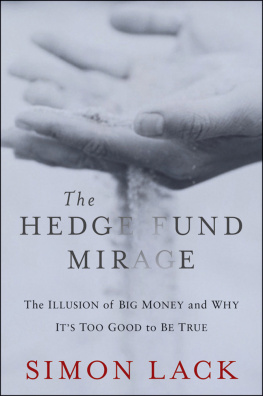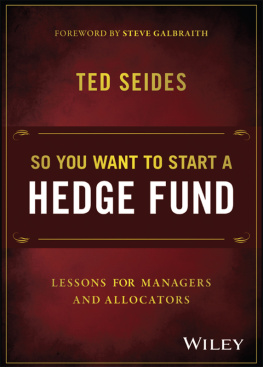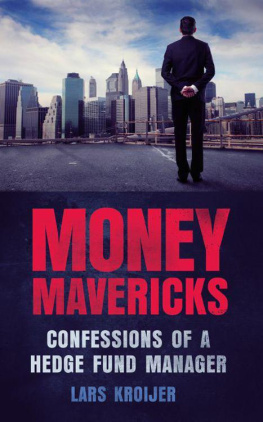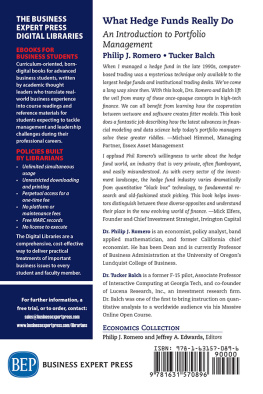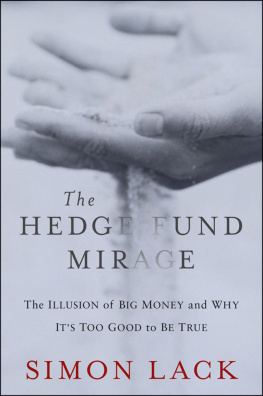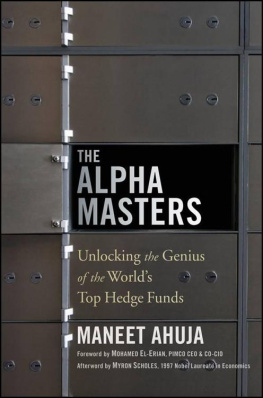Advance Praise for
Damsel in Distressed
This is a witty and wise story of a woman who found success and satisfaction working as an investor in the pointy-end of the finance industryhedge funds. Dominique tells it all, in a way that entertains and inspires both the veteran investor and the aspiring novice.
Amanda Pullinger, Chief Executive Officer of 100 Women in Finance
Dominique Mielle tells the story of her hedge fund career with humor and lan, in a way that illuminates both twenty years of hedge fund history and what it took to be one of the few women of her generation to reach the top ranks of finance.
Professor Jonathan Levin, Dean of the Stanford Graduate School of Business, Philip H. Knight Professor, Senior Fellow at the Stanford Institute for Economic Policy Research
Dominique Mielle delivers a witty and inspiring must-read primer on hedge funds. To any woman considering a finance career, and to anyone invested or interested in hedge fundsread th is book.
Mariam Naficy, Serial Entrepreneur, Founder and CEO of Minted, Author of The Fast Track: The Insiders Guide to Winning Jobs in Management Consulting, Investment Banking, & Securiti es Trading
Mielle offers an insiders view of what its like to be a woman hedge fund manager in an industry overwhelmingly dominated by men. Over a twenty-year career, she describes rising through the ranks to Partner of a $24 billion hedge fund complex with a combination of intelligence, hard work, and an unwillingness to be minimized by ge nderism.
Scott Richland, Chief Investment Officer of the California Institute of Technology, a $3 billion endowment, Guest Lecturer at Stanford, CalTech, and UCLA
A funny account of the inner workings of the hedge fund industry from a unique female voice, helpful to both asset management practitioners and aspiring investment professionals.
Simon Lack, Author of The Hedge Fund Mirage , Founder of SL Advisors and the JPMorgan Incubator
With her impeccable style, good humor, and an immigrants common sense, Dominique Mielle treats us to her storyhow she made money, and her mark, as one of the countrys few women hedge fund investors. A funny, fearless frolic.
Meridee Moore, Founder and Chief Investment Officer of Watershed Asset Management and Board Member of BlackRo ck Capital
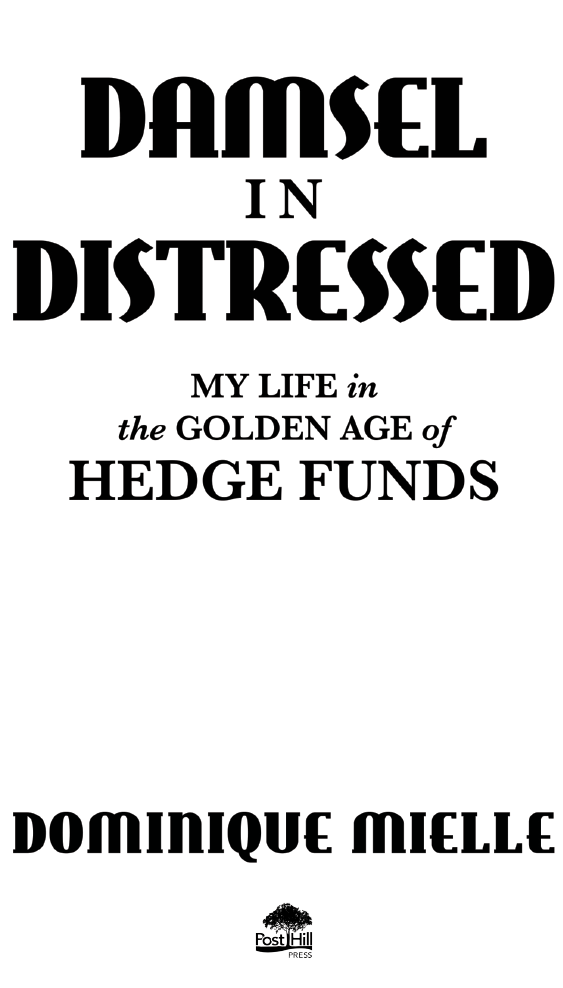
A POST HILL PRESS BOOK
ISBN: 978-1-6 4293-972-9
ISBN (eBook): 978-1-6 4293-973-6
Damsel in D istressed:
My Life in the Golden Age of H edge Funds
2021 by Dominique Mielle
All Right s Reserved
Cover art by Cody Corcoran
Poem permission: U.A. Fanthorpe, Beginners Luck (Bloodaxe Bo oks, 2019)
The information and advice herein is not intended to replace the services of financial professionals, with knowledge of your personal financial situation. The advice and strategies contained herein may not be suitable for your situation. You should consult with a professional where appropriate. Neither the publisher nor author shall be liable for any loss of any profit or any other commercial damages, including, but not limited to special, incidental, consequential, or other damages. All investments are subject to risk, which should be considered prior to making any financial decisions. Although every effort has been made to ensure that the professional advice present within this book is useful and appropriate, the author and publisher do not assume and hereby disclaim any liability to any person, business, or organization choosing to employ the guidance offered in this book.
No part of this book may be reproduced, stored in a retrieval system, or transmitted by any means without the written permission of the author and publisher.

Post Hill Press
New York Nashville
posthil lpress.com
Published in the United States of America
Contents
Its hard for a girl to be sure if
She wants to be rescued. I mea n, I quite
Took to the dragon. Its nice to be
Liked, if you know wh at I mean.
U. A. F anthorpe,
Not My Best Side

O n my first day at Canyon Partners, the Dow Jones dropped 512 points, or more than 6 percent. The Nasdaq had its worst daily loss in history. Bloomberg screens were bleeding and traders fervently wished, a few hours into the session, for a circuit breakeror their moms. The entire years gain was neatly wiped out by closing time. Under the circumstances, my entrance may have appeared a touch incongruous, my attitude a tad tone-deaf when I marched into the office that morning, enthusiastic, a spring in my step, deeply tanned from a two-month-long summer vacation after I finished business school. I felt great. Positively delighted to be there. No one warned me that I had arrived amid a financial meltdown. When I interviewed for the position, in April of 1998, the firm managed $1 billion in assets, which seemed both a ludicrously large and pleasantly round number. By the time I started in August of that same year, I overheard that we held $500 million in assets and was quietly perplexed. Had there been a typo in my original notes?
I had not misunderstood. With the capital markets in full-blown crisis mode, the firm had indeed lost half its money in just a few months. The organization had started in 1991 while the hedge fund industry itself was very new, and Canyon debated in its first years whether to be an advisory firm or a hedge fund. The former, like a consulting firm, does not invest capital, whereas the latter focuses on attracting and deploying money from investors. In 1998, along with my arrival as a new employee, came a series of crises of such magnitude that they jeopardized most of the assets, and hence jeopardized the very existence of my new employer.
Asia, particularly Thailand, was engulfed in a currency meltdown that had started the previous summer and threatened to spread to Western economies in a worldwide economic collapse. Russia, meanwhile, was the poster child of overleverage. Its ballooning budget deficit had been financed through debt, a third of which was sold to international investors. As its economy slowed down, the ruble plummeted, inflation ran wild, and interest rates shot up. On August 17, 1998, the country defaulted on its domestic debt, and declared a moratorium on repaying foreign debt. Canyon had invested in Russia, so not only did it lose a good amount of money during the so-called Russian Flu, but those losses shook investors confidence to the point that numerous started withdrawing their money.
The biggest hedge fund at the time, Long-Term Capital Management, heavily involved in the Russian treasury bond market and leveraged over twenty times, was hemorrhaging almost $4 billion in losses and facing the unthinkable: bankruptcy. The funds prospective failure could be so perilous to global financial markets and investors worldwide that it had to forcefully be gobbled up by another hedge fund in a deal hastily arranged by the Federal Reserve Bank. The head of Long-Term Capital, John Meriwether, had been a legend. The Bond King, they called him. He was the hero of Michael Lewiss wonderful book Liars Poker, the stuff that every pubescent girl aspiring to be a big deal in finance looks up to.
One could say that Meriwether was caught up in a low-probability, high-consequence sequence of events. Bad luck, in other words. But a lesser-known fact is that Meriwether started two more hedge funds after Long-Term Capital; they both closed too, after seven years or less. Its tough to argue that the man ran out of luck three times in a row.
Next page




